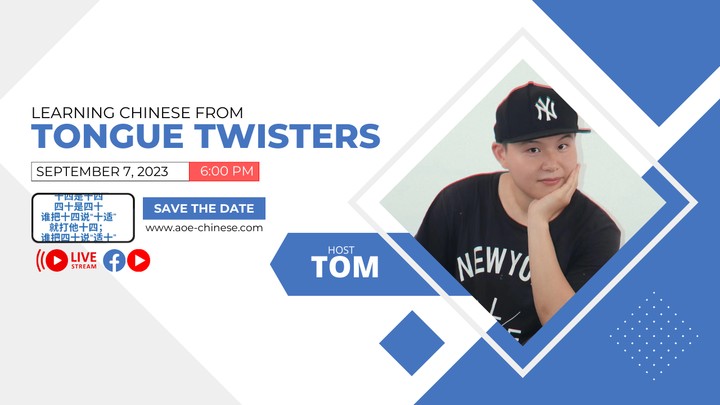FAQ
Contact Us
Online Inquiry
Learning Chinese from tongue twisters
- author:
AOE CHINESE
- pubdate:
2023-09-08 00:00:00

on the 7th of Setpember, AOE conducted a livestream session on youtube with the topic "Learning Chinese from tongue twisters"
Chinese is an extremely interesting language. There are four different tones, and it consists of 23 initial constants(b,p,m,f,g,k,n,l..........) and final or compound vowels(a,e,i,o,u). There are four different tones that can be applied to the vowels, which can make interesting pronunciation. And the word u and v can also be extremely confusing. Today, in order to better distinguish between these different pronunciations, we can try the tongue twister challenge.
Why should we try the tongue twister challenge:
1. test our comfort and fluency with Chinese pronunciation
2. Increase our understanding of Chinese language
We will try the tongue twisters one by one, and I will explain what they mean as well as some of the tricks behind them.
Twister #1:四是四,十是十,十四是十四,四十是四十。莫把四字说成十,休将十字说成四。若要分清四十和十四,经常练说十和四。
Four is four, ten is ten, fourteen is fourteen, and forty is forty.
四 here is four. 十 here means ten. You see si and shi have confusing pronunciations. Si has the fourth tone, and shi has the second tone. 是 here means is. 是 and 十 have confusing pronunciations because of different tones, but they have the same consonants and vowels. Si and shi have the same tones but different consonants, distinguished as one contains h and the other doesn’t. When you say them fast, you can mix them up quite easily.
Shisi and sishi are quite confusing. So if you say them fast enough, you can make lots of funny mistakes.
The word 莫 and 休 have the same meaning. They both mean don’t. For example, people say 休想. 你休想拿我一分钱.
And the last statement:若要分清四十和十四,经常练说十和四。This tells us the reality. Forty and fourteen are quite confusing, and you have to constantly practice pronouncing them in order to say them correctly.
Now let’s try to say them faster.
Now let’s try another tongue twister about grapes:
吃葡萄吐葡萄皮儿,不吃葡萄不吐葡萄皮儿。吃葡萄不吐葡萄皮儿,不吃葡萄倒土葡萄皮儿。
Eat the grapes and spit out the grape skins. Don’t eat the grapes and don’t spit out the grape skins. Eat the grapes and don’t spit out the grape skins. Don’t eat the grapes but spit out the grape skins.
Let’s pay attention to some of the words here. 葡萄 means grapes. 皮 means skin. 儿 is a part of the 儿字音 which makes the tongue twister a bit more challenging yet interesting. 倒 is a transitional word which means but.
吐 and 葡 they have the same vowels, but different tones and initial consonants. 萄 and 吐 have the same initial consonants but different vowels, so this is quite confusing when you try to same them together. Also, the meaning of the first sentence is opposite from that of the last sentence, and this could also cause some confusion.
This is a tongue twister people practice during childhood and you can try to say it faster to see if it feels fun.
And here we have another tongue twister about artillery and model soldiers. And the tongue twister is challenging because the meanings of each sentence can be rather confusing.
八百标兵奔北坡,炮兵并排北边跑。炮兵怕把标兵碰,标兵怕碰炮兵炮。
The translation of this tongue twister goes: Eight hundred model soldiers ran north, and the artillery ran side by side to the north. The artillery is afraid of touching the artillery, the artillery is afraid of touching the artillery’s canon.

